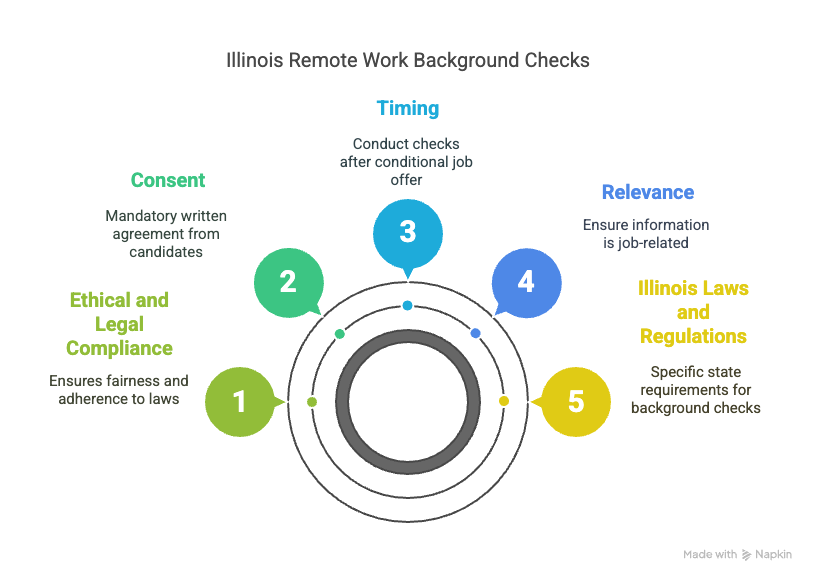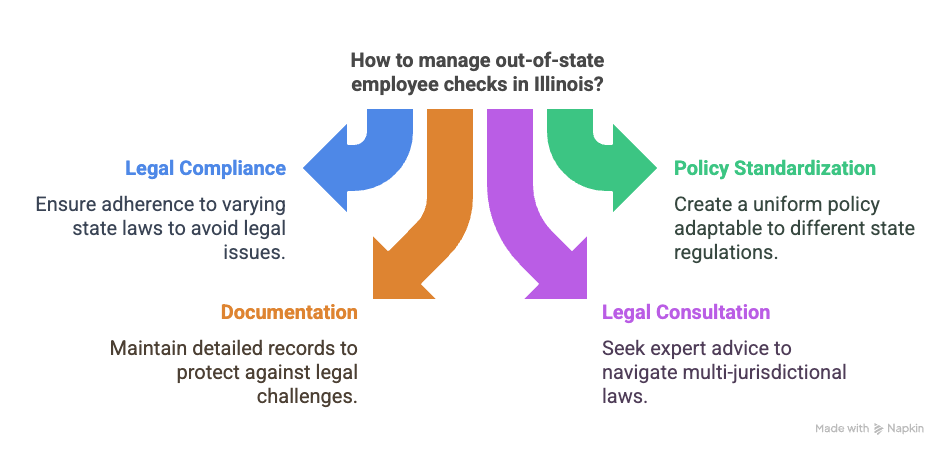In the era of remote work, Illinois employers face unique challenges and obligations when it comes to conducting background checks for prospective and current employees. Understanding these requirements is crucial for complying with state and federal laws, especially given the complexities of multi-jurisdictional employment. This guide provides a comprehensive look into the intricacies of Illinois remote work background checks, ensuring that employers remain compliant while hiring top talent from within and outside state lines.
Key Takeaways
- Remote work has increased the importance of background checks to ensure employee trust, especially in Illinois.
- Illinois has specific regulations like the Ban the Box law, which impacts background checks.
- Hiring remote workers across state lines requires understanding and complying with varied state laws.
- Employers must maintain secure data practices and adapt background check processes for telecommuting roles.
- Ongoing legal guidance and using technology can enhance compliance and efficiency in remote background checks.
Introduction
Remote work has shifted from a perk to a norm, affecting how you hire. With the shift, background checks have become even more important. They're not just about vetting skills and experience; they're crucial for building trust. When an employee works from home, you need assurance of their integrity and reliability.
In this article, you'll learn about background checks for remote workers in Illinois. We'll cover the legal landscape, key compliance steps, and how to handle multi-jurisdictional challenges. Whether you're hiring within Illinois or across state lines, staying informed about the latest compliance requirements is essential.
Understanding Illinois Remote Work Background Checks
When conducting background checks in Illinois, you need to navigate several specific laws and regulations. Start with the Illinois Human Rights Act, which prohibits discrimination based on arrest records and protects employee rights during background checks. Make sure you adhere to the Ban the Box legislation, which requires removing questions about criminal records from job applications until after an interview or a conditional job offer is made.
Focus on three main considerations: relevance, timing, and consent. First, ensure the information you seek is relevant to the job position. For example, a driving history may be crucial for a delivery role but not for a graphic designer. Timing is key; perform these checks at the appropriate stage of the hiring process, typically after making a conditional offer. Consent is mandatory—obtain it in writing before proceeding with any background check.
How does Illinois compare with other states? Unlike Illinois, some states do not have Ban the Box laws or enforce them differently. Others might have stricter requirements around disclosing background check results to applicants. For instance, California demands that employers provide copies of public records checks to applicants, which is not a requirement in Illinois. Understanding these nuances can help you align your practices with Illinois law, even when hiring remote workers from other states.

Are you fully aware of the disparate impacts such checks can introduce? It's crucial to evaluate whether your practices disproportionately affect certain groups and adjust accordingly to maintain fairness and compliance. Stay informed on the latest legal updates and consider involving legal counsel to keep your processes up to date.
Illinois Out-of-State Employee Checks
When hiring remote employees from outside Illinois, you face certain challenges, especially with background checks. Each state has its own set of laws and regulations that may affect your hiring process. Let's explore these challenges and how to address them.
First, consider the legal variances. States like California and New York have stricter regulations concerning consumer privacy and background checks. If you're hiring from these states, you must align your practices with their laws while maintaining compliance with Illinois regulations.
To maintain consistency, create a standard background check policy that can be adapted as necessary. This ensures that regardless of where your remote hire is based, you're treating everyone equally. This means paying attention to consent forms and disclosure notices, making sure they are legally sound in all relevant jurisdictions.
Documenting your process is crucial. Keep a detailed record of every step taken during the background check. This includes the initial request for information, consent forms, and final reports. Clear documentation helps protect your company if any legal challenges arise.

Ask yourself: are you ready for the differences in state laws? Have you prepared your policies to reflect these variations? By knowing these answers, you put yourself in a better position to manage multi-state hires and reduce your legal risks.
Lastly, consider collaborating with legal professionals who specialize in employment law. Working with someone knowledgeable in multi-jurisdictional employment laws can provide valuable guidance and keep your remote hiring practices compliant.
Remote Hiring Compliance in Illinois
You need clear steps to follow for remote hiring compliance in Illinois. First, get familiar with the state's human rights and labor laws. Illinois requires you to handle personal data with care, adhering to the Illinois Human Rights Act and other relevant laws.
Begin your process by obtaining candidate consent. Under the Fair Credit Reporting Act (FCRA), gaining written permission is not an option—it's a requirement. Clearly disclose your intention to perform a background check and inform candidates of their rights.
Create a structured procedure for background checks. Define which roles necessitate different levels of scrutiny. Not all roles require the same depth of checking. Customize checks to match the responsibilities involved.
Consistency is key. Apply the same measures to all candidates for a specific role. In Illinois, this keeps you fair and avoids potential bias claims.
Keep updated on laws affecting remote work compliance. The landscape can shift with new legislation. Regularly review your policies to ensure they meet current legal standards.
Taking these steps positions you well, enabling you to safely expand your workforce across state lines while staying within the bounds of Illinois law.
Illinois Telecommuting Background Checks
When dealing with telecommuters, Illinois employers have specific requirements to navigate. Among the foremost considerations is ensuring that the background check process aligns with both state laws and the remote nature of telecommuting roles. Telecommuting, by definition, usually involves a home office setting. This setup requires employers to think about not just the employee's background but also the security of the environment they are working in.
One key requirement is to ensure the safety and security of company data. With employees accessing sensitive information from potentially unsecured networks, it's critical to conduct thorough security assessments. You should evaluate the telecommuter's technical setup to shield company data from breaches. This might mean assessing the encryption and security measures of the telecommuter's home network.
Addressing remote work concerns involves tackling issues like accountability and productivity. Telecommuting can blur the lines between work and personal life. Employers may worry about productivity loss or data mishandling. To mitigate these risks, setting clear expectations and monitoring systems can prove useful. In some cases, it might be necessary to reevaluate the hiring criteria specific to remote positions to ensure candidates are self-motivated and responsible.
Employers must remain agile, adapting their background check processes to address unique telecommuting challenges while staying compliant with Illinois legislation. Are you considering how your current background check process accommodates remote roles, particularly in ensuring data security? Your approach might need to include updated policies drafted with the help of legal counsel to tackle these specific demands effectively.
Multi-Jurisdictional Checks in Illinois
Handling background checks across multiple states can feel complex, but a few strategies can simplify the process. Start by establishing a clear framework that considers the laws of each relevant jurisdiction. This includes thoroughly understanding the Fair Credit Reporting Act (FCRA) and how it meshes with state-level laws.
Different states may have unique requirements. For instance, "Ban the Box" laws vary, which can influence when and how you ask about criminal histories. Coordinate these checks by documenting each state’s particular rules, ensuring full compliance no matter where your candidates reside.
Legal discrepancies can trip up an otherwise smooth process. If Illinois law allows for certain disclosures that another state doesn't, consult with your legal team. They can help craft policies that respect both local and national regulations. Staying ahead of these legal nuances is essential for minimizing risks and ensuring fair hiring practices.
Consider involving your legal experts when drafting and updating your background check policies. Their input is crucial in harmonizing the differences across state lines, keeping your approach legally sound and current. Collaboration with experienced legal minds offers an edge in managing a compliant and streamlined hiring process.
Use of Technology in Remote Background Checks
Technology can simplify and streamline the background check process for remote employees. Several digital tools are designed to make this process efficient and secure.
Start with background check software like Checkr or GoodHire. These platforms offer user-friendly interfaces and integrate easily with your HR systems. They provide thorough checks that include criminal records, education verification, and employment history. Using such tools reduces manual efforts and speeds up the hiring process.
However, with digital processes come data privacy concerns. Protect sensitive applicant information using encryption and secure databases. Ensure compliance with laws like the Fair Credit Reporting Act that governs data handling. Mistakes in data protection could lead to hefty fines and legal trouble.
To ensure compliance, verify that your selected technology updates according to the latest state and federal requirements. Regular updates are crucial, as compliance standards frequently change. Confirm that these tools allow you to customize checks based on specific state laws, an essential feature for employers dealing with multi-jurisdictional hires.
By incorporating these tech tools, you not only conduct efficient background checks but also uphold compliance and protect your company from potential risks. Are you using the right technology for your remote hiring processes, and is it keeping you fully compliant?
Best Practices and Recommendations
Creating effective background check policies for remote work settings starts with understanding the unique challenges that come with telecommuting. Recognize that policies must cater to both Illinois regulations and those of other jurisdictions where your employees might reside.
Start by developing clear, standardized background check policies. These policies must comply with Illinois's legal requirements and reflect best practices suitable for remote work dynamics. Ensure they cover all elements from consent to data protection. This structured approach helps avoid legal mishaps and ensures transparency across the board.
Training your HR team is crucial. Equip them with the knowledge they need to perform compliant background checks. Regular workshops and up-to-date training sessions can transform how your team approaches checks, making sure they are both thorough and swift. Consider using real-life case studies to illustrate the complexities they might encounter, enhancing their capability to manage irregular situations.
Background checks are not static. Laws and regulations evolve. A consistent review and update process for your background check policies is essential. Schedule periodic audits to assess compliance and effectiveness, adjusting strategies as needed. Technology can aid in this process by providing streamlined ways to track changes in regulations and policy requirements.
Would these steps improve the accuracy and compliance of your remote background checks? Implement them and observe the changes in how smoothly your process runs. These practices not only shield you from legal pitfalls but also safeguard your company's reputation.
Conclusion
Legal compliance is non-negotiable. Keeping updated on the laws and requirements for background checks makes a world of difference. Thorough checks are not just about meeting legal standards — they protect your company and enhance your hiring.
What are your next steps? Consider consulting with legal experts to ensure your methods align with current laws. Regularly review your policies. Stay informed about regulatory updates.
Remote hiring expands your talent options. Embrace it, but remember to stay compliant. Doing so keeps your hiring process smooth and your company secure.
Frequently Asked Questions (FAQs)
Do Illinois background checks apply to remote workers in other states?
Yes. Illinois companies can require background checks on remote workers regardless of their location. The checks must comply with both Illinois laws and the laws of the state where the remote worker resides.
How can you verify education for remote employees in Illinois?
You can verify education credentials by contacting the institutions directly or using third-party verification services. Ensure you have written consent from the employee before initiating these checks.
Can Illinois employers require drug tests for remote workers?
Yes. Illinois employers can require drug tests for remote workers. Ensure you comply with relevant laws in the employee's state, as regulations can vary.
Are Illinois remote workers subject to other states’ laws?
Yes. Remote workers living in other states are subject to the laws of the state in which they reside. It's crucial to understand both Illinois and local state requirements.
Do Illinois companies need to check remote workers’ local laws?
Yes. Illinois companies should ensure compliance with local laws where remote workers reside. This may affect employment terms, taxes, and work conditions.
How can you handle county-specific checks for Illinois remote hires?
For county-specific checks, identify the counties relevant to the remote hire and perform checks based on local regulations. Third-party background check services can streamline this process.
Can a remote worker sue an Illinois employer for faulty checks?
Yes. If a background check violates legal guidelines or results in incorrect information, a remote worker can pursue legal action against the employer.
Are international remote workers subject to Illinois checks?
Generally no, unless they have direct ties to the state like maintaining a residence or dual employment status. Employers should focus on applicable international employment laws.
Do Illinois gig workers need background checks?
It's not mandatory but evaluating risks associated with the role might necessitate a check. Companies often consider the nature of work and amount of access to sensitive data.
What’s the cost of multi-state checks for Illinois employers?
Costs vary. Employers might spend anywhere from $30 to over $100 per check based on the depth and breadth of data required. Pricing can vary among service providers.
What are common elements included in an Illinois background check?
Standard checks often include criminal records, education verification, and employment history. Depending on the job, you might also check driving records or financial history.
How long does it take to complete a background check in Illinois?
A standard background check can take from one day to two weeks. The timeline depends on the complexity of the check and response times from different agencies.
Can an employee refuse a background check in Illinois?
Yes. While an employee can refuse, employers have the right to see refusal as a negative point in employment decisions. Consent is usually required for processing checks.
Is it necessary to inform candidates about the results of their background checks in Illinois?
Yes. Under the Fair Credit Reporting Act, you must inform candidates if their background check results lead to adverse employment decisions, and provide them with a copy of the report.
Definitions
Ban the Box
This policy limits when an employer can ask about a candidate’s criminal history. In Illinois, you can’t ask about criminal records on a job application. You must wait until after the first interview or until you’ve made a conditional job offer. The goal is to give all applicants a fair chance before being judged on their criminal background.
Consent
Consent means getting written permission from the candidate before running a background check. Under the Fair Credit Reporting Act (FCRA), this is mandatory. You must clearly inform the candidate that you plan to check their background and explain what the check includes.
Fair Credit Reporting Act (FCRA)
The FCRA is a federal law that regulates how employers collect and use consumer information, including background checks. It requires employers to get written consent, notify candidates if adverse action is taken, and ensure accuracy in reporting. Failing to follow the FCRA can result in legal penalties.
Multi-jurisdictional Hiring
This refers to hiring employees who live and work in different states than your company’s base office. For example, if you hire a remote worker from New York while your company is based in Illinois, you must follow employment laws in both states. This includes differences in background check rules, privacy regulations, and consent requirements.
Background Check Policy
A background check policy outlines your company’s process for screening candidates. It covers when checks are done, what types are conducted, how consent is obtained, and how records are stored. A clear policy helps ensure fair treatment, legal compliance, and consistency across remote and in-office hiring.
Still have questions?
Get in touch with our team today for a personalized demo and discover how our tailored volume pricing and packages can drive results for your business!
How useful was this page?*
Note: your comments are anonymous. We use them to improve the website. Do not include any personal details.
Visit our FCRA Compliance Tool or leave a message here if you need a response.
From the blog Explore the GCheck Content Hub

Employment Credit Checks: 2026 Guide to Legal Compliance and Best Practices
7 Jan, 2026 • 27 min read
I-9 Form Management Systems: Modernizing Employment Eligibility Verification for 2026
6 Jan, 2026 • 19 min read
EEOC Compliance Requirements 2026: Complete Employer Guide to Fair Hiring Practices
29 Dec, 2025 • 24 min readThe information provided in this article is for general informational and educational purposes only and should not be construed as legal advice or a substitute for consultation with qualified legal counsel. While we strive to ensure accuracy, employment screening laws and regulations—including but not limited to the Fair Credit Reporting Act (FCRA), Equal Employment Opportunity Commission (EEOC) guidelines, state and local ban-the-box laws, industry-specific requirements, and other applicable federal, state, and local statutes—are subject to frequent changes, varying interpretations, and jurisdiction-specific applications that may affect their implementation in your organization. Employers and screening decision-makers are solely responsible for ensuring their background check policies, procedures, and practices comply with all applicable laws and regulations relevant to their specific industry, location, and circumstances. We strongly recommend consulting with qualified employment law attorneys and compliance professionals before making hiring, tenant screening, or other decisions based on background check information.

